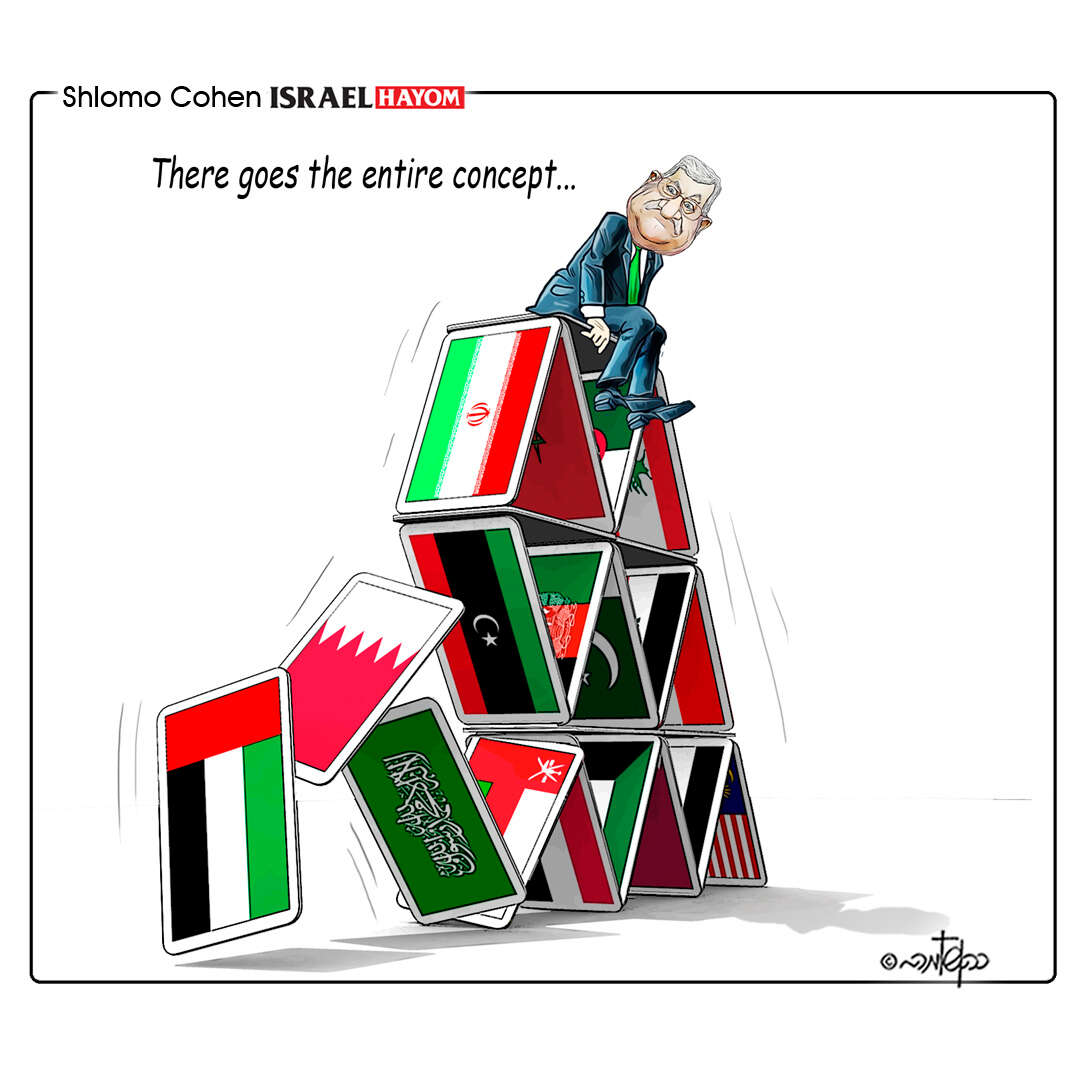Michael Doran: The Emperor’s New Clothes
When President Donald Trump presided over the signing ceremony for the Abraham Accords between Israel, the UAE, and Bahrain last week on the South Lawn of the White House, his critics cast the event as a real-life enactment of “The Emperor’s New Clothes” in which Trump played a minimal role in a meaningless accord involving two tiny Arab nations that had never made war on the Jewish state. “The Emperor’s New Clothes” is indeed an apt analogy, but it was Trump’s critics—not the president—who were shown to be naked.INSS: Seventy Years to UNRWA — Time for Structural and Functional Reforms
The Abraham Accords are the most significant development in the Arab-Israeli conflict in the last 25 years. Not only have the Palestinians lost their veto over normalization between Israel and other Arab states, but the entire “Resistance Alliance,” led by Iran, has revealed itself as incapable of placing obstacles in the way of Israel’s integration into the Arab state system. True, the UAE and Bahrain are small powers, but behind them looms Saudi Arabia, which is by far the most influential Arab state. Without Riyadh’s tacit support, the celebration on the White House lawn would never have materialized. If Trump wins the election in November, there is a good chance that Riyadh will normalize relations with Israel—to say nothing of Kuwait, Oman, Qatar, Morocco, and Sudan, who are also waiting in the wings.
To be sure, the Palestinian seat at the next White House party will likely remain empty, and the Israeli-Palestinian conflict will simmer away for many years to come. But that is true of many dozens of sectarian and nationalistic conflicts around the world, including those in Spain, Belgium, Italy, and Ukraine—to confine the list only to Europe. No one in the world has a plausible solution to the Palestinian question, and the best diplomatic minds have devoted more time and effort on it than any other question on the planet for reasons that are now beginning to recede into history.
Trump’s diplomacy posited that the best way to manage this conflict was not to blow more hot air into a punctured balloon, but to reduce it to its true geostrategic proportions. Thanks to this strategy, the Palestinian-Israeli conflict seems likely in time to become the Eastern Mediterranean equivalent to the Western Sahara conflict: an insoluble but localized dilemma with a specific set of local human costs. The debilitating lock that it has placed on American strategic thinking for decades has been broken. In breaking that lock, Trump has created a process to end the Arab-Israeli conflict—which unlike the local Israeli conflict with the Palestinians, had real geostrategic significance.
It is equally notable that Trump’s masterstroke came by breaking the hold of the Washington foreign policy establishment on the Middle East peacemaking business. In denigrating his accomplishment, the leading lights of American foreign policy have also conveniently erased from memory their unblemished record of outrageously bad predictions. What will happen, former Secretary of State John Kerry was asked in a television interview in 2016, if President Trump would make good on his campaign promise to move the United States Embassy in Israel to Jerusalem? “You’d have an explosion,” Kerry answered, “an absolute explosion in the region, not just in the West Bank, and perhaps even in Israel itself, but throughout the region.”
The year 2020 marks seventy years since UNRWA (United Nations Relief and Works Agency for Palestine Refugees in the Near East), which serves Palestinian refugees in the Gaza Strip, the West Bank, Jordan, Syria, and Lebanon, began operation. Since its establishment by virtue of the mandate given to it by the UN General Assembly, UNRWA has not succeeded in bringing about the true rehabilitation of the Palestinian refugees and in reducing their number, which has risen from approximately 700,000 on the eve of the State of Israel’s establishment to over 5.5 million refugees in 2020. The impact of the regional upheaval on the Palestinian refugees, the stagnation of the political process between Israel and the Palestinians, the split in the Palestinian arena, the humanitarian distress in the Gaza Strip, the centrality of the refugee issue in the Palestinian narrative, and the American administration’s 2018 decision to stop funding UNRWA pose even more complex challenges for the agency. In light of the understanding of the need for changing the agency’s modes of operation and adapting them to the challenges of the current reality, and given that all attempts and recommendations to significantly reform the agency’s modes of operation over the years having been thwarted, this memorandum discusses UNRWA’s operational concept and functioning and presents four alternative models of operation, along with a methodology for analyzing the different alternatives.New Palestinian curriculum shows no improvements, antisemitism remains
Click here to download the full Memorandum
The Palestinian Authority's newly released educational curriculum shows no substantive changes for the better, despite assurances earlier this year that egregious examples of antisemitism and hate education would be eliminated.David Singer: PLO and Hamas should let their citizens emigrate
An analysis by the new curriculum by IMPACT-se, a research and policy institute that analyzes schoolbooks and curricula through UNESCO-derived standards on peace and tolerance, has found that educational textbooks for use in Palestinian schools throughout the West Bank remain openly antisemitic, encourage violence, and promote jihad and martyrdom.
Some 82% of the books remain unchanged from last year, while 152 modifications were found within the remaining 40 books, according to IMPACT-se's analysis. However, 88% of those adjustments either keep the problematic material intact or amplify it.
In one such modification, a reading comprehension exercise on Dalal Mughrabi, a terrorist who led the Coastal Road Massacre killing 38 Israelis, was replaced by text on Khalil al Sakakini, a notorious antisemite and Nazi sympathizer. Mughrabi meanwhile remains within the book, having been moved to a different section where she is lauded as the "crown of the nation."
In another, math is still being taught to 4th graders through the example of the number of "martyrs" who died in the intifadas, although this figure has been modified downwards from 2,026 to 1,392.
The PLO’s continuing refusal to negotiate with Israel on President Trump’s Peace Plan - whilst also denouncing the peace treaties signed by the United Arab Emirates (UAE) and Bahrain with Israel - sees 'West Bank' and Gazan Arabs remaining captive to accepting these disastrous PLO decisions without any rights to vote or emigrate.
These disenfranchised, beleaguered and long-suffering populations have seen the PLO reject proposals for peace flowing from: 1993 Oslo Accords, 2000 Camp David Summit, 2003 Bush Road Map, Israel’s unilateral disengagement from Gaza 2005 2007 Annapolis Conference, 2014 Kerry negotiations and Trump’s 2020 deal of the century – reportedly endorsed by Qatar.
Financial assistance to improve their miserable lives has been lost – including: $750 million annually from direct American aid $360 million per annum in American aid to UNRWA America terminating its payment of 22% of UNESCO’s annual budget following UNESCO’s admission of the “State of Palestine” as a member contrary to American domestic law and in contravention of UNESCO’s own constitution $28.5 billion that would have flown from international donors at the Manama Conference held on 25/26 June 2019 if the Trump Peace Plan was implemented.
The UAE voiced its support for the Manama Conference and what it hoped would be achieved:
“The UAE supports all international efforts aimed at supporting economic progress and increasing opportunities in the region, and alleviating the suffering of people in the region, particularly our brothers in Palestine... It (the Conference) aims to lift the Palestinian people out of misery and to enable them for a stable and prosperous future,"
Hamas and the PLO violently opposed and boycotted the Manama Conference.



































.jpeg)



